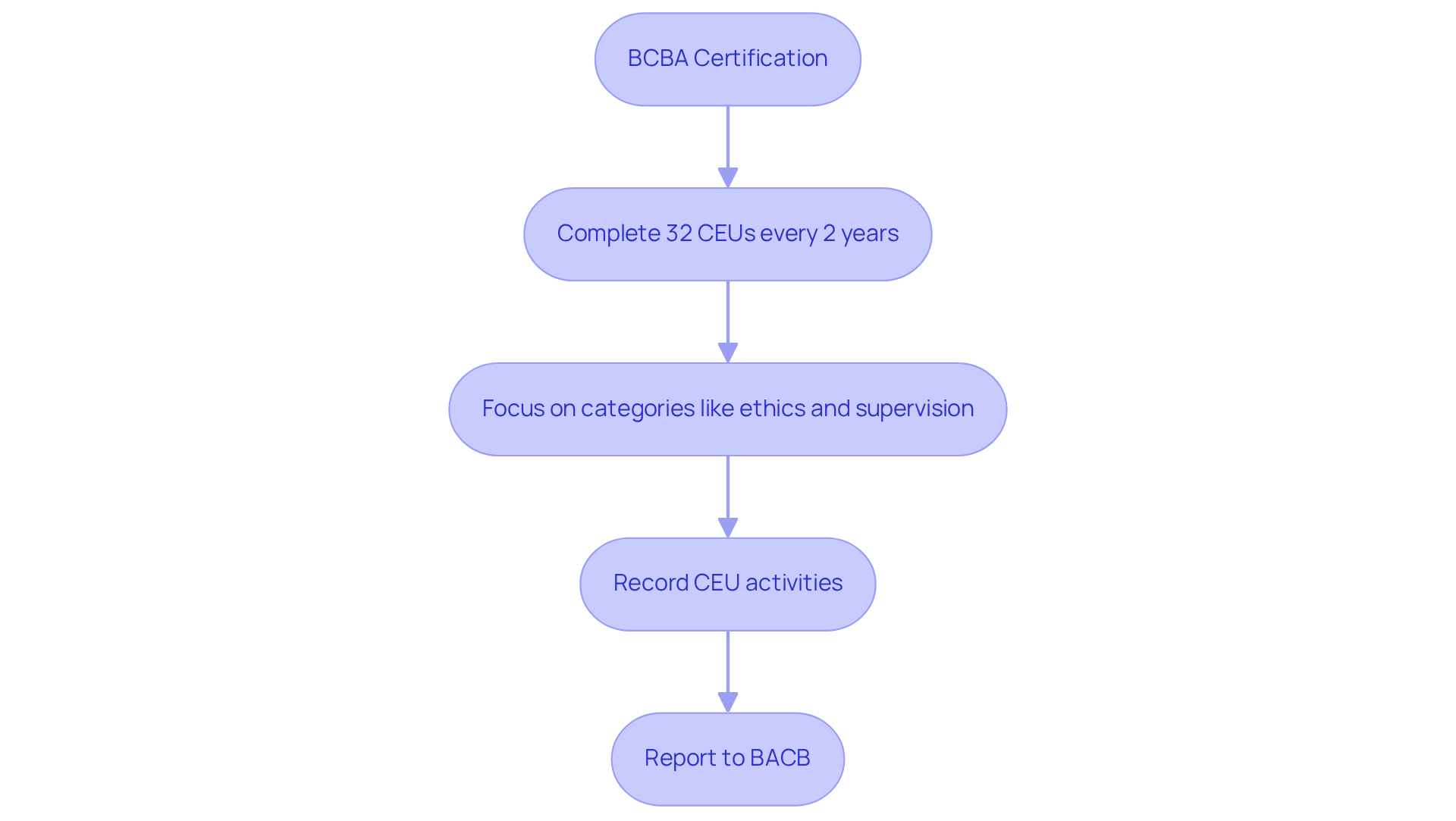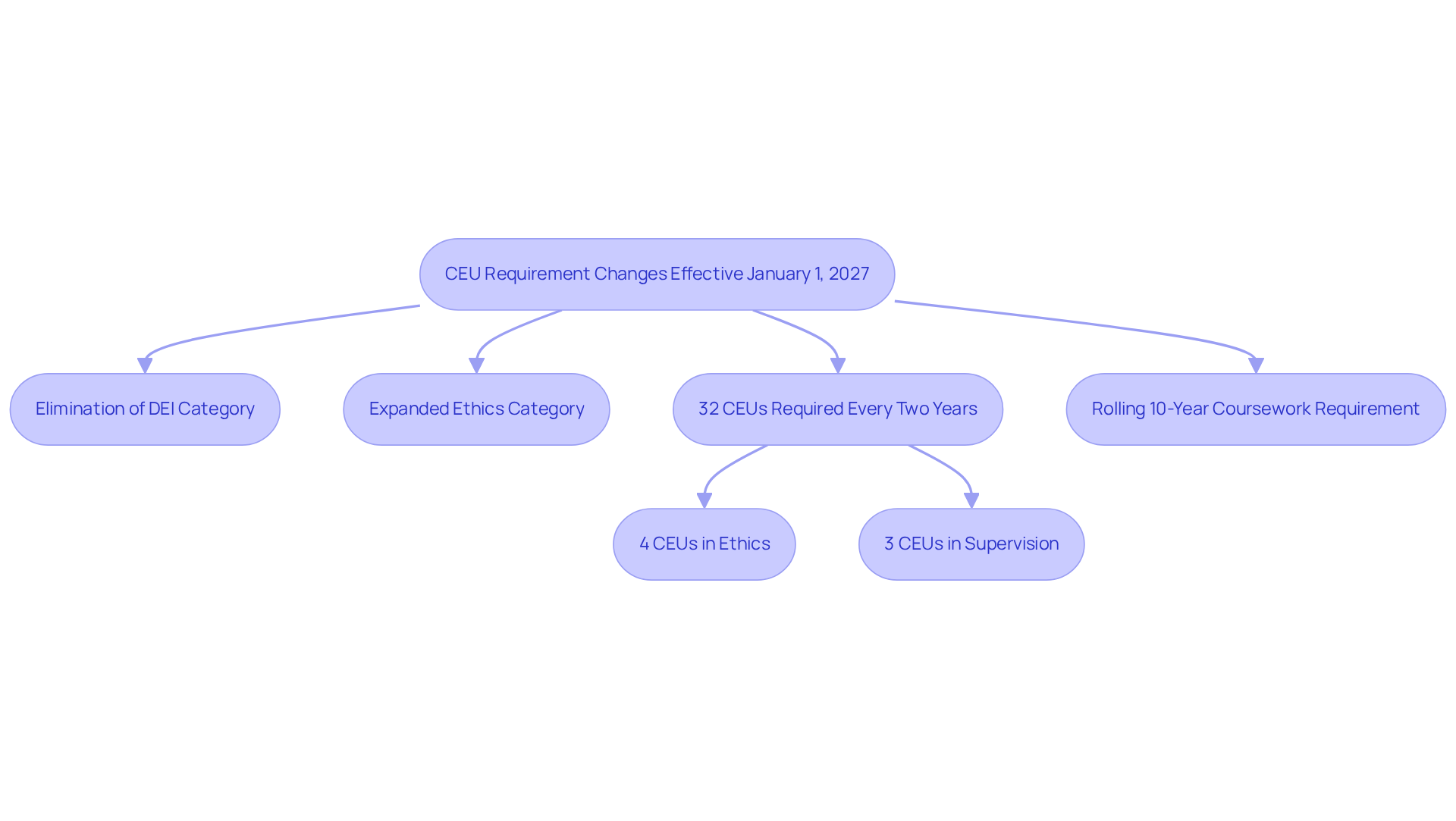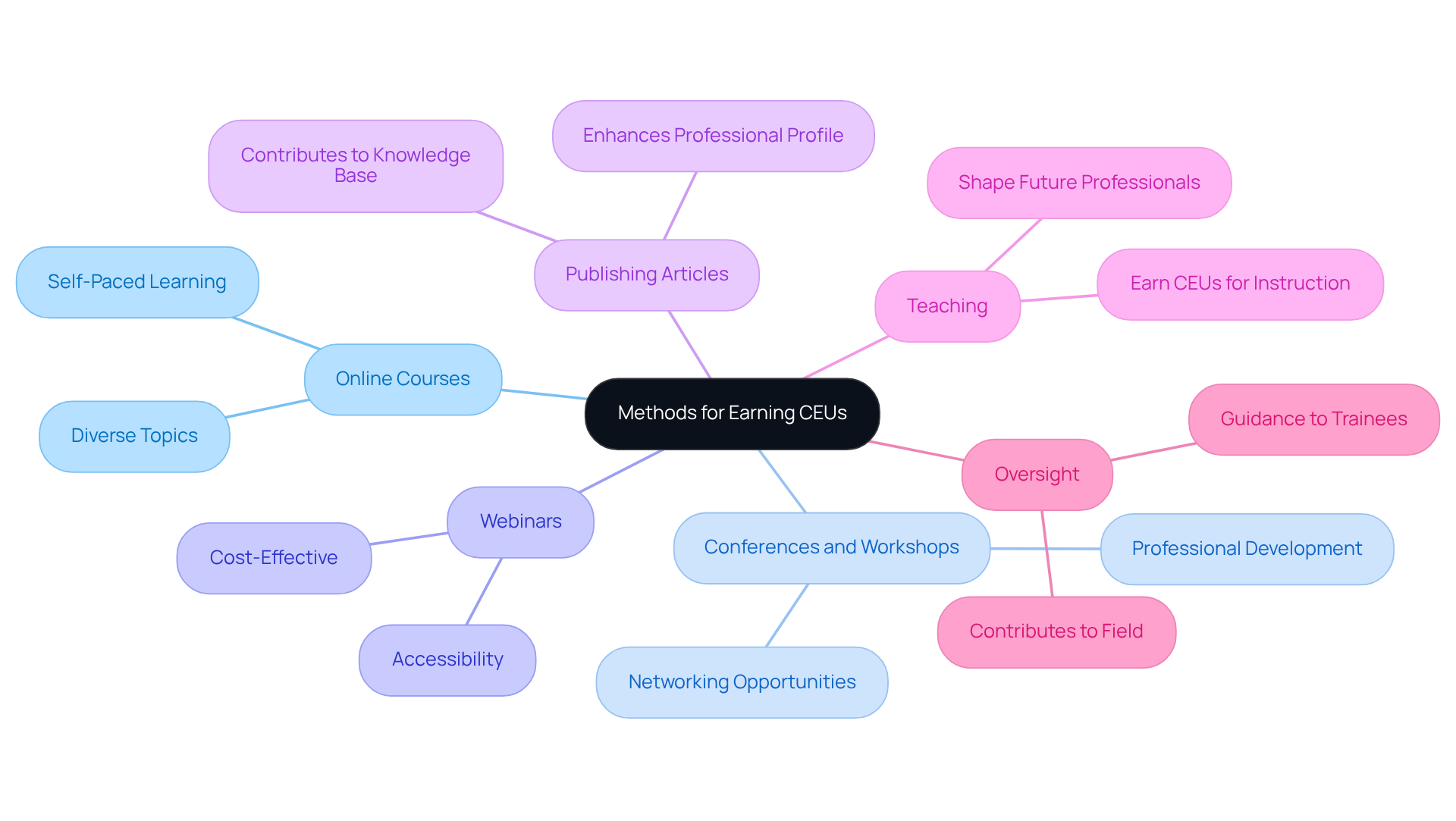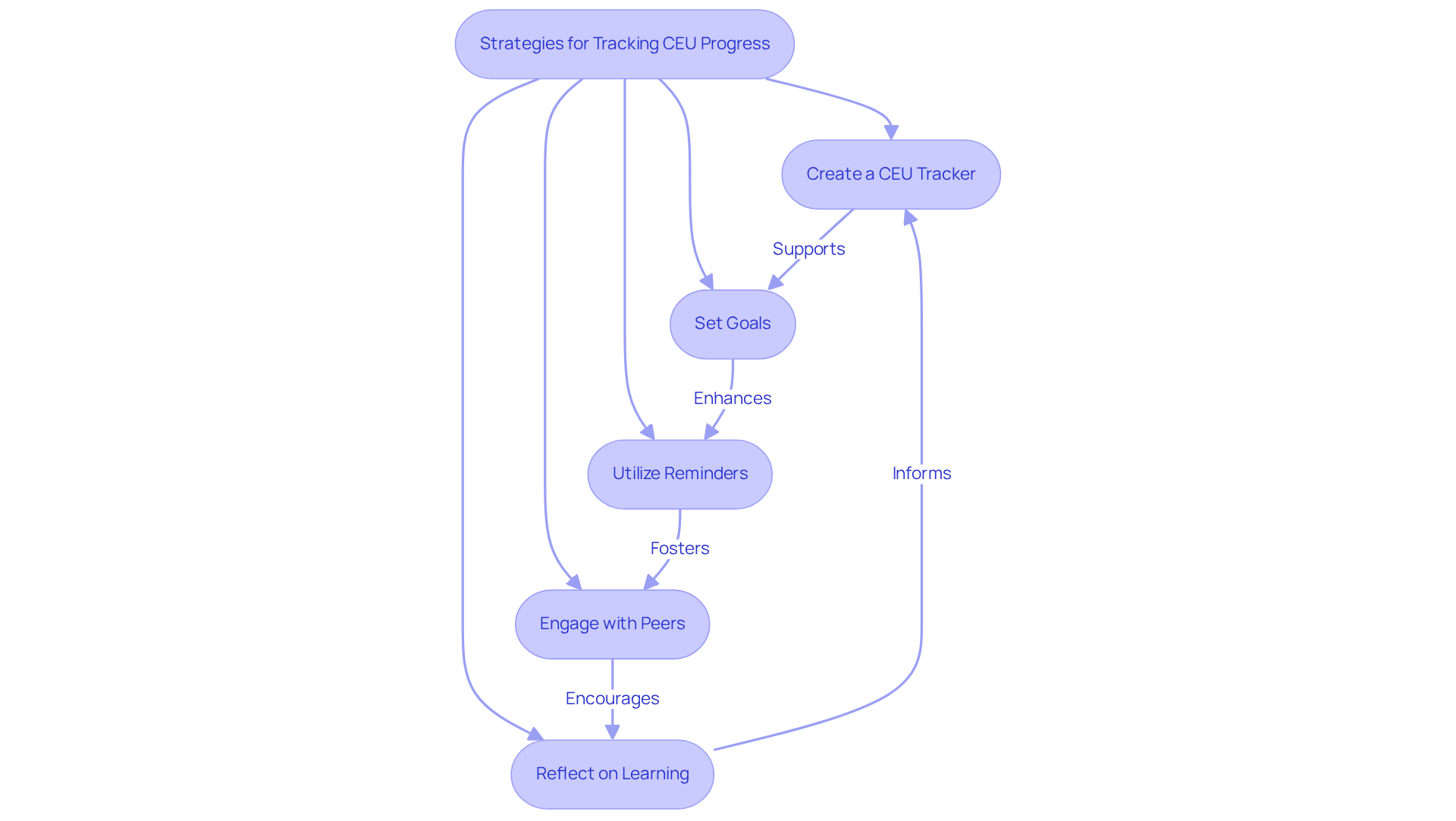July 1, 2025

The article outlines the imminent modifications to the BACB Continuing Education Unit (CEU) requirements, alongside strategies for Board Certified Behavior Analysts (BCBAs) to adeptly navigate these changes. Notably, beginning in 2027, the DEI category will be integrated into the ethics component. This shift underscores the critical nature of ongoing education and the meticulous tracking of CEUs, which are essential for compliance and the enhancement of professional development within the realm of Applied Behavior Analysis.
Navigating the complexities of Continuing Education Units (CEUs) is essential for Board Certified Behavior Analysts (BCBAs) who aim to maintain their certification and enhance their professional practice. As significant changes loom for BACB CEU requirements in 2027, understanding the implications of these updates becomes crucial for BCBAs seeking to remain compliant and competitive in a rapidly evolving field.
How can behavior analysts effectively adapt to these new regulations while ensuring their ongoing professional development and commitment to ethical standards?
Continuing Education Units (CEUs) are a vital measure for evaluating participation in organized learning activities that fulfill the BACB CEU requirements and enhance the professional knowledge and skills of Board Certified Behavior Analysts (BCBAs). To uphold their certification, BCBAs are required to fulfill the BACB CEU requirements by completing every two years, which cover vital categories such as ethics and supervision. Notably, starting in 2027, DEI content will no longer be a separate requirement for BCBAs and BCaBAs. This structured obligation not only guarantees that behavior analysts remain abreast of the latest research and best practices but also reinforces high ethical standards within the field of Applied Behavior Analysis (ABA).
The Behavior Analyst Certification Board (BACB) outlines the BACB CEU requirements, mandating specific types of continuing education to ensure that behavior analysts maintain their ethical integrity, competence, and alignment with best practices. Engaging in continuous education through professional development significantly enhances BCBA competencies, ultimately leading to improved patient care and outcomes.
Furthermore, BCBAs must keep meticulous records of their CEU activities to fulfill the BACB CEU requirements and report them accurately to the BACB. As the demand for behavior analysts continues to escalate, the commitment to ongoing learning becomes increasingly essential for professional growth and effectiveness in practice. Planning ahead for fulfilling BACB CEU requirements is crucial to prevent last-minute stress during the recertification cycle.

Effective January 1, 2027, the Behavior Analyst Certification Board (BACB) will implement substantial modifications to the BACB CEU requirements for [Board Certified Behavior Analysts](https://hireaba.today). Notably, the Diversity, Equity, and Inclusion (DEI) category will be eliminated, with its content now integrated into an expanded ethics category. Board Certified Behavior Analysts are still required to meet the BACB CEU requirements of completing 32 CEUs every two years, but the focus will shift towards ethical practices and supervision, with four CEUs in ethics and three in supervision mandated.
Furthermore, a new rolling 10-year coursework requirement will be introduced, meaning that any coursework completed over a decade ago will no longer be eligible for CEU credit. This restructuring seeks to guarantee that behavior analysts stay up-to-date with in the field.
As Dr. Jim Carr, CEO of BACB, noted in a recent podcast, "These changes reflect our commitment to maintaining high standards in behavior analysis and ensuring that our professionals are equipped to meet the demands of the field."
As the demand for behavior analysts is expected to increase by 25% by 2026, remaining updated on these developments is essential for preserving certification and improving professional skills. Adapting to these new regulations will be essential, and behavior analysts are encouraged to seek out relevant courses and resources to meet the updated standards effectively.
A recent case study highlighted that the elimination of the DEI category was influenced by evolving regulations and the need for a more focused approach to ethics in behavior analysis. This context underscores the importance of compliance with the BACB CEU requirements as part of maintaining certification.

BCBAs can earn CEUs through a variety of methods, each offering unique benefits:
Reflect on your current hiring challenges—how can these methods enhance your professional standing while ensuring you meet ? Consider leveraging these opportunities to advance your career effectively.

To effectively track and plan CEU progress, BCBAs can implement several strategies that ensure compliance with while enhancing professional development.
Periodically check the BACB website for updates on the BACB CEU requirements. This practice ensures that your tracking aligns with current standards and practices. As the Behavior Analyst Certification Board indicates, "Continuing Education Units are not merely a bureaucratic obligation; they’re essential for the professional vitality of Board Certified Behavior Analysts and Board Certified Assistant Behavior Analysts."
By adopting these strategies, BCBAs can more effectively navigate the BACB CEU requirements, ensuring they remain compliant while continuing to provide high-quality services in the field of ABA therapy.

Continuing Education Units (CEUs) are essential for the certification and professional development of Board Certified Behavior Analysts (BCBAs). With significant changes to BACB CEU requirements expected in 2027, it is crucial for BCBAs to understand these modifications and their implications to remain compliant and effective in their practice. The shift towards a greater emphasis on ethics and supervision, coupled with the introduction of a rolling 10-year coursework requirement, highlights the necessity of ongoing education in adapting to the evolving standards within the field of Applied Behavior Analysis.
This article outlines key strategies for earning and tracking CEUs. From online courses and conferences to teaching and publishing, various methods exist to fulfill CEU requirements while enhancing professional knowledge. Moreover, effective planning and goal-setting can mitigate the stress associated with meeting these obligations, allowing BCBAs to concentrate on delivering high-quality services to their clients.
Ultimately, a commitment to continuous learning and adaptation not only fortifies individual practice but also elevates the standards of the behavior analysis profession as a whole. By actively engaging with the resources and strategies discussed, BCBAs can adeptly navigate the evolving landscape of CEU requirements, ensuring they remain competent and ethical practitioners in a field that is increasingly in demand. Embracing these changes is not merely a regulatory necessity; it is a vital step towards fostering excellence in the care provided to those they serve.
What are Continuing Education Units (CEUs) and why are they important for BCBAs?
CEUs are a measure of participation in organized learning activities that fulfill the BACB CEU requirements. They are important for BCBAs as they enhance professional knowledge and skills, ensuring that behavior analysts remain updated on the latest research and best practices.
How many CEUs must BCBAs complete to maintain their certification?
BCBAs are required to complete 32 CEUs every two years to uphold their certification.
What categories do the required CEUs cover?
The required CEUs cover essential categories such as ethics and supervision.
Will there be any changes to the CEU requirements starting in 2027?
Yes, starting in 2027, DEI content will no longer be a separate requirement for BCBAs and BCaBAs.
How do CEUs contribute to the ethical standards of BCBAs?
CEUs ensure that behavior analysts maintain their ethical integrity and competence, reinforcing high ethical standards within the field of Applied Behavior Analysis (ABA).
What is the importance of keeping records of CEU activities for BCBAs?
BCBAs must keep meticulous records of their CEU activities to fulfill the BACB CEU requirements and report them accurately to the BACB.
Why is ongoing education important for BCBAs?
Ongoing education is essential for professional growth and effectiveness in practice, especially as the demand for behavior analysts continues to increase.
What should BCBAs do to avoid stress during the recertification cycle?
BCBAs should plan ahead to fulfill BACB CEU requirements to prevent last-minute stress during the recertification cycle.
Our expert recruitment strategies and AI-driven sourcing ensure that you receive top-notch candidates quickly, without compromising on quality. Whether you’re looking for BCBAs, Clinical Directors, or RBTs, we’ve got you covered.